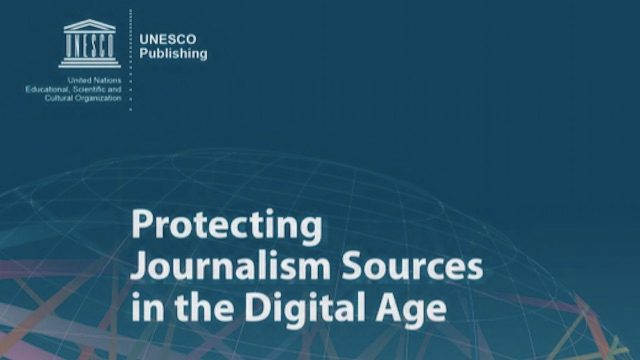SUMMARY
This is AI generated summarization, which may have errors. For context, always refer to the full article.

MANILA, Philippines – A massive study on media trends in 121 countries shows increasing threats to investigative journalism as new laws and technologies make it more difficult for journalists to protect the identity of sources.
The UNESCO study “Protecting Journalism Sources in the Digital Age” seeks to encourage journalists to train themselves on digital security, educate the public, and advocate for institutional reforms to protect journalists and their sources.
Investigative journalism is highly dependent on confidential sources and whistleblowers. The study shows how the combination of 3 elements – surveillance, data retention, and national security legislations – have greatly challenged the sustainability pursuing much needed investigative reports.
The study was authored by former World Editors Forum/WAN-IFRA Research fellow Julie Posetti. It will be launched on World Press Freedom Day, May 3, in Jakarta.
It discusses the following recent trends and incidents that the author described as “utterly chilling, and urgent reform is required,.”
- security agencies intercepting reporters’ emails
- US customs officials seizing journalists’ phones
- Australian Federal Police admitting that they illegally accessed a journalist’s metadata
Security laws, surveillance, data retention
Legal ways to protect sources have bee overidden by national security and anti-terrorim legislation, undercut by surveillance – mass surveillance and targeted surveillance – and jeopardized by mandatory retention policies such as those forced on Internet Service Providers (ISPs), telecommunications companies, search engines, and social media platforms.
These factors represent a “direct challenge” to the universal human rights of freedom of expression, the study said.
“It finds that the legal frameworks that support protection of journalistic sources, at international, regional and country levels, are under significant strain – a development that is seen to represent a direct challenge to the established universal human rights of freedom of expression and privacy, and one that especially constitutes a threat to the sustainability of investigative journalism,” according to a press release issued by UNESCO.
Posseti said she hopes the study will prompt moves to defend investigative journalism against these challenges.
13 key findings
The press release cited 13 key findings, detailing challenges, opportunies, and recommendations based on the experiences of the countries that were studied.
- The issue of source protection has come to intersect with the issues of mass surveillance, targeted surveillance, data retention, the spill-over effects of anti-terrorism/national security legislation, and the role of third party Internet companies known as “intermediaries”
- Legal and regulatory protections for journalists’ sources are increasingly at risk of erosion, restriction and compromise
- 84 UNESCO Member States out of 121 studied (69%) for this report demonstrated developments relevant to the protection of confidentiality of journalistic sources, mainly with actual or potential impact, between 2007 and mid-2015
- Individual states face a need to introduce or update source protection laws
- Source protection laws need to cover journalistic processes and communications with confidential sources – including telephone calls, social media, messaging apps, and emails – along with published journalism that depends on confidential sources
- Transparency and accountability regarding both mass and targeted surveillance, and data retention, are critically important if confidential sources are to be able to continue to confidently make contact with journalists
- Without substantial strengthening of legal protections and limitations on surveillance and data retention, investigative journalism that relies on confidential sources will be difficult to sustain in the digital era, and reporting in many other cases will encounter inhibitions on the part of potential sources
- It is recommended to define ‘acts of journalism’, as distinct from the role of ‘journalist’, in determining who can benefit from source protection laws
- To optimize benefits, source protection laws should be strengthened in tandem with legal protections extended to whistleblowers, who constitute a significant set of confidential journalistic sources
- Journalists are increasingly adapting their practice in an effort to partially shield their sources from exposure, but steps to limit anonymity and encryption undermine these adaptations.
- The financial cost of the digital era source protection threat is significant (in terms of digital security tools, training, and legal advice), as is its impact on the production and scope of investigative journalism based on confidential sources
- There is a need to educate both journalists and citizens in digital safety
- Journalists and others who rely on confidential sources to report in the public interest may need to train their sources in secure methods of contact and information-sharing
– Rappler.com
Add a comment
How does this make you feel?
There are no comments yet. Add your comment to start the conversation.